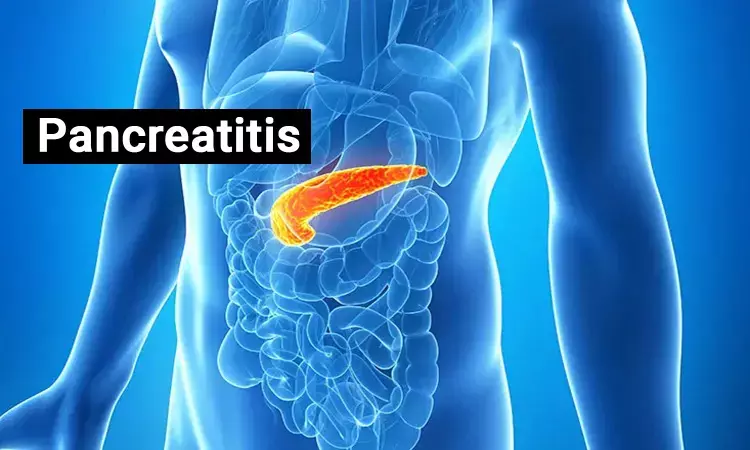- Home
- Medical news & Guidelines
- Anesthesiology
- Cardiology and CTVS
- Critical Care
- Dentistry
- Dermatology
- Diabetes and Endocrinology
- ENT
- Gastroenterology
- Medicine
- Nephrology
- Neurology
- Obstretics-Gynaecology
- Oncology
- Ophthalmology
- Orthopaedics
- Pediatrics-Neonatology
- Psychiatry
- Pulmonology
- Radiology
- Surgery
- Urology
- Laboratory Medicine
- Diet
- Nursing
- Paramedical
- Physiotherapy
- Health news
- Fact Check
- Bone Health Fact Check
- Brain Health Fact Check
- Cancer Related Fact Check
- Child Care Fact Check
- Dental and oral health fact check
- Diabetes and metabolic health fact check
- Diet and Nutrition Fact Check
- Eye and ENT Care Fact Check
- Fitness fact check
- Gut health fact check
- Heart health fact check
- Kidney health fact check
- Medical education fact check
- Men's health fact check
- Respiratory fact check
- Skin and hair care fact check
- Vaccine and Immunization fact check
- Women's health fact check
- AYUSH
- State News
- Andaman and Nicobar Islands
- Andhra Pradesh
- Arunachal Pradesh
- Assam
- Bihar
- Chandigarh
- Chattisgarh
- Dadra and Nagar Haveli
- Daman and Diu
- Delhi
- Goa
- Gujarat
- Haryana
- Himachal Pradesh
- Jammu & Kashmir
- Jharkhand
- Karnataka
- Kerala
- Ladakh
- Lakshadweep
- Madhya Pradesh
- Maharashtra
- Manipur
- Meghalaya
- Mizoram
- Nagaland
- Odisha
- Puducherry
- Punjab
- Rajasthan
- Sikkim
- Tamil Nadu
- Telangana
- Tripura
- Uttar Pradesh
- Uttrakhand
- West Bengal
- Medical Education
- Industry
COX-2 inhibitors may prevent severe acute pancreatitis

The management of Severe acute pancreatitis is complicated because of the limited understanding of the pathogenesis, multiple risk factors, and few treatment modalities.
China: Cyclooxygenase-2 (COX-2)-inhibitor treatment may reduce severe acute pancreatitis (SAP) by nearly half in at-risk patients, according to a new randomized controlled trial conducted by doctors at Sichuan University, China and published in American Journal of Gastroenterology.
Severe acute pancreatitis (SAP) is associated with high morbidity and mortality due to the development of pancreatic and extra-pancreatic necrosis, their subsequent infection and multisystem organ failure (MOF). The management of SAP is complicated because of the limited understanding of the pathogenesis, multiple risk factors, and also the availability of very few treatment modalities.
Dr Huang and his colleagues of West China Hospital and Sichuan University in Chengdu, China., based on an experimental evidence showing overexpression of COX-2 in acute pancreatitis, and that blocking COX-2 reduced pancreatitis severity, conducted a randomized trial in which 190 patients with predicted SAP received standard treatment or standard treatment plus 40 mg per day of parecoxib intravenously for 3 days, followed by 200 mg of celecoxib orally or through a feeding tube every day for 1 week.
COX-2 inhibitors, besides offering organ support, "effectively block the inflammatory cascade during the development of severe acute pancreatitis," stated by Drs. Libin Huang, Zhiyin Huang, and Chengwei Tang. "This regimen presented good cost-effectiveness," they added.
They came out with the following findings:
• SAP developed in 21% of the COX-2 group compared to 40% of the conventional treatment group.
• Organ failure was most likely to be transient in the cox-2 group.
• The mortality rate was similar for the two groups.
• all patients had above-normal serum levels of C-reactive protein (CRP), tumour necrosis factor-alpha (TNF-alpha) and interleukin-6 (IL-6). TNF-alpha and IL-6 were reduced in both groups at day 4 and day 8 of the study, but the reduction was greater in the COX-2 group.
• Two-thirds of the conventional treatment group required meperidine injections, compared to about 43% of the COX-2 group.
• Mean hospital stay and hospital costs were also lower with COX-2 inhibitors (21 days vs. 13 days)
"The lack of a placebo to attain double-blinding may affect the pain scoring system since it is a patient-reported outcome. Being open and conducted in a single centre, there might be some data bias." these were the limitations in the trial noted by the researchers.
For further reading click on the following link,
The American Journal of Gastroenterology: March 2020 - Volume 115 - Issue 3 - p 473-480
MBBS
Dr K B AARTHI-has completed MBBS from SRM UNIVERSITY TAMIL NADU,Her interest is in the field of Pediatrics and Anaesthesia, also passionate in doing research and publishing articles.She joined Medical Dialogues in 2020 and publishes health news and medical updates. Email: editorial@medicaldialogues.in. Contact no. 011-43720751,9786713226
Dr Kamal Kant Kohli-MBBS, DTCD- a chest specialist with more than 30 years of practice and a flair for writing clinical articles, Dr Kamal Kant Kohli joined Medical Dialogues as a Chief Editor of Medical News. Besides writing articles, as an editor, he proofreads and verifies all the medical content published on Medical Dialogues including those coming from journals, studies,medical conferences,guidelines etc. Email: drkohli@medicaldialogues.in. Contact no. 011-43720751


